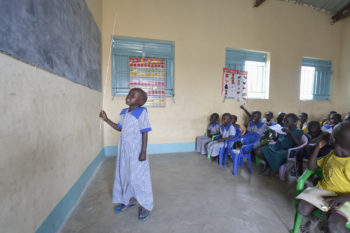
The Lutheran World Federation, a member of the ACT Alliance, is helping families in the region, which is torn by both war and drought, to educate their children, with a special focus on insuring that girls enter and remain in school.
Parental consent obtained for main subject. South Sudan
Santino Deng Lou is an Education Supervisor from Aweil Town West Payam, in South Sudan. He has been working with the Girl Education South Sudan (GESS) project for some time and has seen first hand the critical role that this project has played in improving the status of young women and girls in the community.
South Sudan faces significant challenges when it comes to education. Despite some progress, the fragile context and the widespread violence combined with cultural biases have restricted access to education. UNICEF estimates[1] that in 2017, over 1.8 million children were in need of education. Even where limited services were available, a lack of qualified teachers and irregular or non-payment of teacher salaries has severely affected learning. The situation is especially dire for girls. They are less likely to attend school, and compared to boys, they are more likely to drop out.
For a very long time, he reports, young women and girls have been denied the opportunity to attend school as many of them were destined to become girl brides, some from a very tender age. Santino’s family was no exception. When he was a boy, he witnessed his sisters meeting the same fate. As he was really young he did not have the authority and the strength to oppose the oppressive cultural customs and his family’s bias. Today, Santino works to help other young women and girls.
“I was too young to fight for my sisters,” he says, “but now I can do for other girls what I could not do for my own siblings, stand up for their rights.”
The GESS project has been working closely with United Methodist Committee On Relief (UMCOR). Through joint schools monitoring visits GESS officers have developed a new understanding of local education needs and challenges. It has also improved strategies on how best to empower teachers and promote quality educations for boys and girls. The cooperation with UMCOR and their mentoring approach helped the Secretariat overcome logistical hurdles, as the education system in the country is not operating fully.
“This has been a great partnership and mentoring process that I am certain will go a long way in improving education in our state;” says Santino.
Given the fragile situation in the country and the unmet needs of so many young women and girls, Santino hopes that donors will continue to support them in delivering quality education for all.
“To change a community, you don’t need to have the whole community support you immediately, be patient and give them a reason to believe in your vision. It takes time to change a community, but once they understand the importance of what you do, they will want to be part of it and ensure its success.“
[1] https://www.unicef.org/southsudan/stories_new-lease-life-school-girls.html